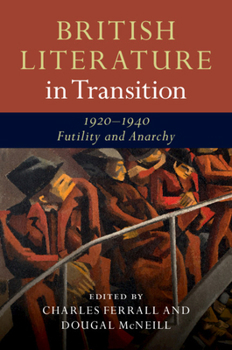British Literature in Transition, 1920-1940: Futility and Anarchy
(Part of the British Literature in Transition Series)
Literature from the 'political' 1930s has often been read in contrast to the 'aesthetic' 1920s. This collection suggests a different approach. Drawing on recent work expanding our sense of the political and aesthetic energies of interwar modernisms, these chapters track transitions in British literature. The strains of national break-up, class dissension and political instability provoked a new literary order, and reading across the two decades between...
Format:Hardcover
Language:English
ISBN:1107145538
ISBN13:9781107145535
Release Date:February 2019
Publisher:Cambridge University Press
Length:384 Pages
Weight:1.45 lbs.
Dimensions:1.0" x 6.3" x 9.3"
Customer Reviews
0 rating





